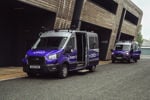The latest computers and hi-tech services available from modern suppliers mean that much of the day-to-day operation of a fleet could be dealt with automatically. This would free the fleet executive from paperwork and other administrative tasks, allowing him or her to concentrate on other key issues such as ensuring drivers are safe to get behind the wheel and examining strategic issues, fleet choice lists and vehicle running costs.
Once this 'fantasy fleet' is up and running, day-to-day demands that used to make up much of the fleet executives work would become a thing of the past. A driver simply filling up with fuel could start a chain of automatic events that would once have involved a whole team of people and mounds of paperwork.
The 'fantasy' driver fills up with petrol, paying with a fuel card and giving his vehicle mileage. This then electronically updates a database at the fleet, or at its fleet management provider, and the computer system is alerted that the car's mileage indicates it is due for a service.
Automatically, the system texts or emails the driver, explaining that a service is needed. The computer system can then automatically book the car in for a service and inform the driver of the date and time he has to take his car in.
When the driver arrives at the garage, the service engineer gets electronic approval for work to be carried out on the car, and once the driver is back on the road, the bill is sent electronically to the fleet.
As it has already been approved, the payment need not be checked if it matches the agreed cost. This transaction also updates the fleet executive's computer systems with details of when the next service is due and adjusts the fleet's running costs as well.
This idea of a fantasy fleet is already reality, according to Jason Francis, managing director of cfc solutions. Fleet executives just need to know where to look.
cfc solutions, owned by dealer group Pendragon, has been a supplier of fleet, contract hire and workshop management solutions for almost a quarter of a century. Its computer software forms a vital part of the chain that could create the paper-free fleet.
The company's computer systems are aimed at automating many of the everyday tasks of fleet management and helping the fleet executive operate more effectively. This could include automatically sending out licence check reminders to fleet managers, or booking cars in for servicing.
Francis said: 'We spend more than £1 million a year on research and development and from that we have created a wide range of systems covering fleet, rental companies, the leasing industry and workshops. The systems can include triggers so the computer automatically knows what to do in a certain set of circumstances.
'So if a service is due, the software would automatically know to send a fax, email or text message to the driver, without the fleet manager becoming involved. In other circumstances, the system could automatically inform a director if a driver is involved in more than one accident.'
Francis believes there has been growing demand for fleet software because of the growing amount of information that executives have to cope with when managing cars and vans.
He estimates that the amount of data handled by UK fleets has multiplied 30 times over the past 10 years on average and is set to increase by the same level again in the next decade.
In the early 1990s, the only data imported into fleet software by most companies was a floppy disc containing fuel card information.
Today, data feeds both into and out of fleet management software linked with a multitude of sources including maintenance providers, insurance companies, tyre networks, human resources systems, accident management specialists, vehicle procurement sources and more.
The change has been witnessed first hand at cfc solutions, which has been involved in fleet technology since 1979. Its first major fleet operator products – System 80, System 85 and System 90 – are still in use by some fleets.
Francis added: 'The mass of information now confronting the fleet manager is potentially overwhelming. Future growth will partially come from a desire for greater control through telematics systems and partly through Government policy changes such as congestion charging and even the satellite tracking of road use that has been mooted recently.'
The company has targeted fleets of different sizes with a different range of solutions, starting with FleetOutlook, a package that dovetails with Microsoft Outlook for fleets of up to 250 vehicles. It allows decision-makers to set reminders and automate important tasks, such as sending out licence check reminders.
Larger fleets can opt for FleetPlus, offering more sophisticated management solutions. As well as fleet decision-makers, the firm also supplies systems to the contract hire industry, through Contract Manager 3; the rental industry, through Rental Manager; and through Workshop Manager, a stock and workshop management solution.
A series of new launches are also planned as part of a major expansion drive by the company.
Francis said: 'We are working on a corporate liability module for fleets, leasing and rental companies. The scope is still fluid, but it will assist with issues such as driver licence checks, accidents and help decision-makers be proactive to show they are meeting their duty of care to drivers.
'The majority of fleet operators don't have a health and safety policy set in stone, so this will help them.'
This expansion is part of a long-term game plan for the company to grow to 10 times its current size in the next decade. Part of that growth will come from a major change in the way fleets view computer software.
The most likely method will be through fleets using the internet to access systems hosted on a cfc solutions' server, Francis said, which could be constantly updated with the latest technology.
Francis said: 'I believe software will go from being owned to fleets renting it and long-term growth will come from rental, rather than ownership.'
But although the method of providing technology might change, the key reasons will remain, he said.
Francis added: 'The amount of information available to the fleet manager is increasing massively and software is the ideal tool to enable management attention to be focussed on the areas that required it.'















Login to comment
Comments
No comments have been made yet.